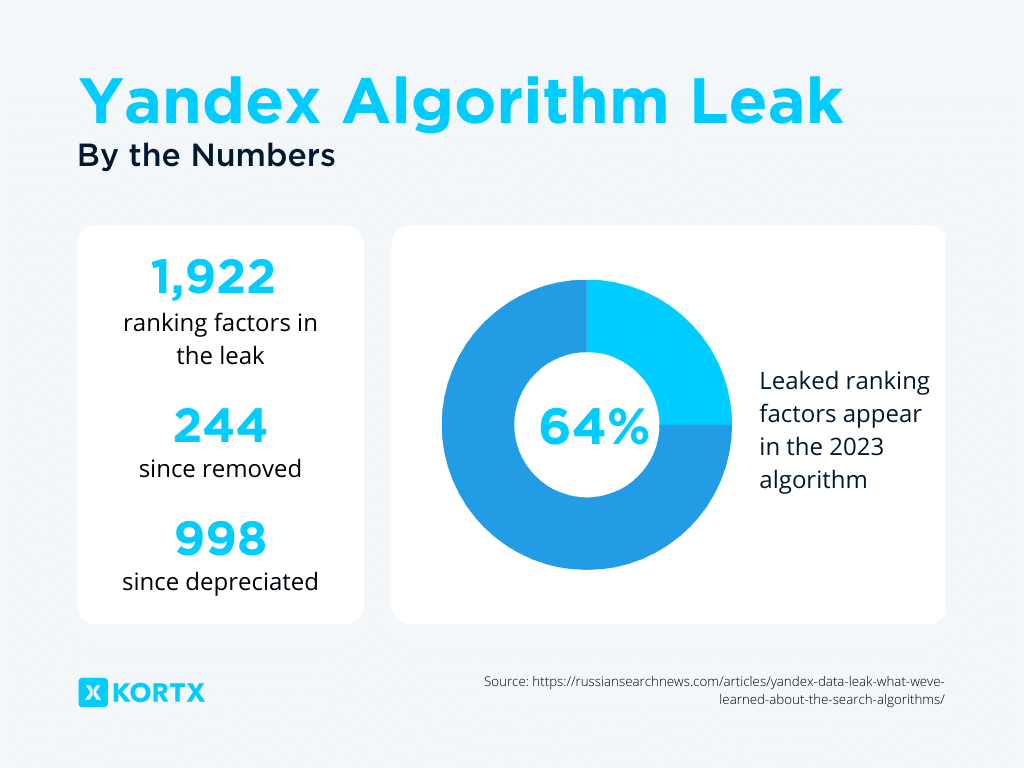Experiences refined for people
Experiences refined for people
One of the biggest mysteries in digital marketing remains “how do search engine algorithms work?” Google continues to be the most popular and talked-about search engine. Outside the big G, plenty of other search engines exist and can give us clues on how these algorithms and code work. The most significant resource for this? The recent January 2023 Yandex search algorithm leak. This extensive code leak provides technical SEOs and engineers with a deep dive into how this algorithm works.
Yandex Search, a Russian-based search engine, is used by over half of Russians and 3.5 billion people worldwide. It’s recently been in the news because of the Kremlin’s recent bans: adjusting or blocking users’ search engine results.
The search engine also came under fire for delisting critic Alexei Navalny from their search results months before an election and was cited for censoring negative news about Vladimir Putin.
💬 How do search engines function (according to a software engineer)? 💬
“Search engines do two things: the first one is scouring the Web to find every web page available.
The second one is they crunch a bunch of different statistics for each site, things like how many other sites link to it, how fast it loads, etc.
Search engines then use those stats (or ranking factors) when you search for something to decide what to show as a result and in what order.
The ranking factors are, thus, the secret sauce of a search engine. They determine how well-matched a search is to its results.
The Yandex leak tells us what each of those factors is, and which factors are weighed more than others.
The ranking factors are like the recipe for Coca-Cola. A protected secret.”
–Javier Fernandez, Software Engineer, KORTX
While Yandex has far more users than the traditional big 3 search engines (Google, Bing, Yahoo), ex-Google employees (allegedly 👀) created the search engine’s code. This fact alone piqued the interest of many search marketing professionals. Is there anything we can learn from the leak?
Revealing nearly 2K ranking factors, the Yandex leak is one of the few times digital marketers gained access to the inner workings of a search engine.
This leak sheds light on the inner workings of a search engine algorithm and what factors it considers when ranking content, offering a deeper understanding of code and programming in the context of search engines.
In short: This leak is interesting to technical SEOs.
Furthermore, it is essential to note that Yandex is not a one-to-one comparison to other search engines.
🤷♀️ Should you care about the Yandex leak? 🤷♀️
“The Yandex leak is not all that interesting from a digital marketing perspective. Unless you are in the weeds regarding technical SEO, this leak doesn’t provide all that much info about how popular search engines like Google or Bing work. From a geopolitical perspective, it is interesting, but it will not impact your marketing.”
–Kaylee Pope, Content Strategy Director, KORTX
The code released appears to be from a disgruntled former Yandex employee. The timeline indicates that this data is probably outdated since search engines update algorithms regularly.
Of the 1,922 revealed ranking factors in the leak, Yandex removed 244 and depreciated (or lowered in importance) 998. Ultimately, only 64% of these factors appear in the Yandex search 2023 algorithm.

⚠️ How do code and software leaks impact software engineers overall? ⚠️
“It is always a painful story for me: Our position as engineers is greatly entrusted. What we do is very opaque to the rest of the world, so we must establish and maintain trust with the rest of the business. News like this hurts that trust, making our work harder.”
–Javier Fernandez, Software Engineer, KORTX
The Yandex search algorithm leak captures a snapshot of the search engine’s hidden code and process. However, the relevance to other popular search engines is limited. While it may be of interest to technical SEOs, it has little impact on marketing. Overall, the leak, while interesting, is not significant.
Our team can work on an on-demand basis to provide technical audits, content suggestions, and training for your team.
We also offer monthly, ongoing SEO consulting services.
|
About the Author
Josh Pettovello is a University of Michigan graduate who enjoys all things data, SEO, and nerding out.
From us to your inbox weekly.